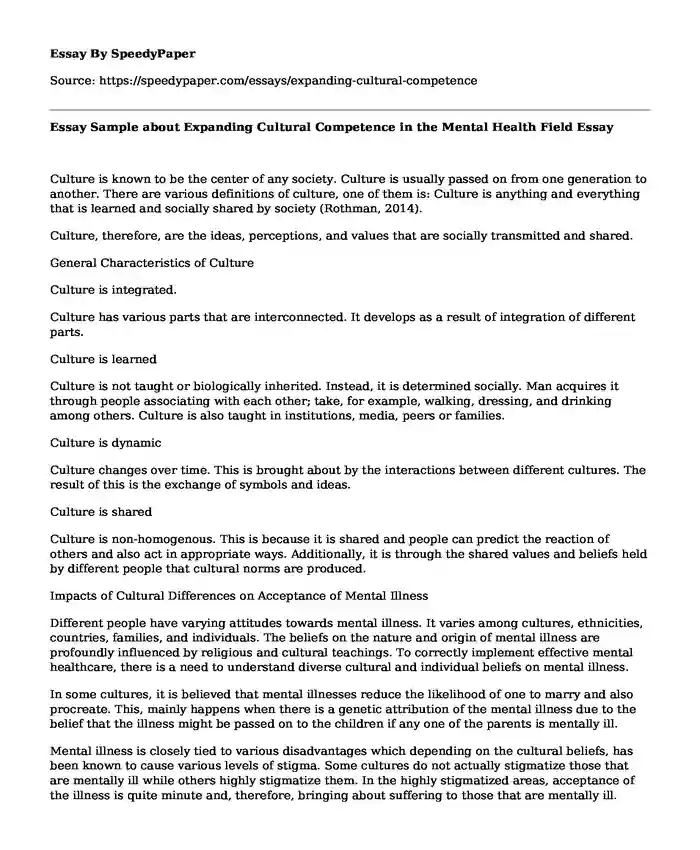
| Type of paper: | Essay |
| Categories: | Culture Mental health |
| Pages: | 3 |
| Wordcount: | 755 words |
Culture is known to be the center of any society. Culture is usually passed on from one generation to another. There are various definitions of culture, one of them is: Culture is anything and everything that is learned and socially shared by society (Rothman, 2014).
Culture, therefore, are the ideas, perceptions, and values that are socially transmitted and shared.
General Characteristics of Culture
Culture is integrated.
Culture has various parts that are interconnected. It develops as a result of integration of different parts.
Culture is learned
Culture is not taught or biologically inherited. Instead, it is determined socially. Man acquires it through people associating with each other; take, for example, walking, dressing, and drinking among others. Culture is also taught in institutions, media, peers or families.
Culture is dynamic
Culture changes over time. This is brought about by the interactions between different cultures. The result of this is the exchange of symbols and ideas.
Culture is shared
Culture is non-homogenous. This is because it is shared and people can predict the reaction of others and also act in appropriate ways. Additionally, it is through the shared values and beliefs held by different people that cultural norms are produced.
Impacts of Cultural Differences on Acceptance of Mental Illness
Different people have varying attitudes towards mental illness. It varies among cultures, ethnicities, countries, families, and individuals. The beliefs on the nature and origin of mental illness are profoundly influenced by religious and cultural teachings. To correctly implement effective mental healthcare, there is a need to understand diverse cultural and individual beliefs on mental illness.
In some cultures, it is believed that mental illnesses reduce the likelihood of one to marry and also procreate. This, mainly happens when there is a genetic attribution of the mental illness due to the belief that the illness might be passed on to the children if any one of the parents is mentally ill.
Mental illness is closely tied to various disadvantages which depending on the cultural beliefs, has been known to cause various levels of stigma. Some cultures do not actually stigmatize those that are mentally ill while others highly stigmatize them. In the highly stigmatized areas, acceptance of the illness is quite minute and, therefore, bringing about suffering to those that are mentally ill.
Impact of Cultural Differences in Accessing Mental Healthcare
Some cultures believe that mental illness is aligned with biomedical perspectives while others believe and emphasize on non-biomedical beliefs and interpretations of symptoms of mental illness. Some cultures see psychiatric medications central while others report frustrations when focus is directed towards seeking psychiatric assistance.
Other ethnic groups view clinical diagnoses of mental illness as potentially and socially damaging and, therefore, prefer to describe their mental illness conditions as a mere nervous disorder which to them holds less stigma.
Impacts of Cultural Differences on Complying With Treatment of Mental Illness
Some cultures do not believe in the medical treatment of mental illness. This distrust of the health care professionals is brought about by religious beliefs, stigma, communication barriers and lack of confidence in the medical profession. There are those that view mental illness as a personal weakness while others believe that they can deal with the illness on their own which results in failure to seek medical attention. Nevertheless, there are cultures who entirely put their trust in health care professionals and hence seek care for their mental illness.
Mental Health and Illness According To the Hindu Culture
The view of this culture on mental health and illness involves religious, naturalistic and magical elements. Hinduism has beliefs which see human natures aspects being integrated and independent. The concept the Hindu culture has towards health is inseparable from beliefs on spiritual and physical health.
In the Hindu culture, there is a belief that the soul needs to be reincarnated over some cycles of birth and death till it attains peace with Brahma in a heaven state which is only possible when the soul is pure enough. There is a law of moral causality that controls imperfection in human affairs called Karma. The law guarantees that a person is reborn into a life that is in accordance to their past actions in their past life. Therefore, mental illness according to Hindu is believed to be a result of actions in the past life (Conway, 2012).
References
Conway, C. R. (2012). Book Review: "Oxford Bibliographies: Hinduism and Christianity" Journal of Hindu-Christian Studies, 25(1). doi:10.7825/2164-6279.1526
Rothman, J. (2014). The Meaning of Culture - The New Yorker. Retrieved from http://www.newyorker.com/books/joshua-rothman/meaning-culture
Cite this page
Essay Sample about Expanding Cultural Competence in the Mental Health Field. (2019, Oct 28). Retrieved from https://speedypaper.net/essays/expanding-cultural-competence
Request Removal
If you are the original author of this essay and no longer wish to have it published on the SpeedyPaper website, please click below to request its removal:
- Essay Example on Suggested Seizure Treatment
- Free Essay Example on Public Service
- Personal Essay Sample: The Worst Exam Experience
- Free Paper Sample with the Overall Review of Cloud Computing
- Free Essay on Museum and the Exhibition
- Free Essay: America Before and After World War 1
- Free Essay: Does Sleep Deprivation Affect Memory?
Popular categories




